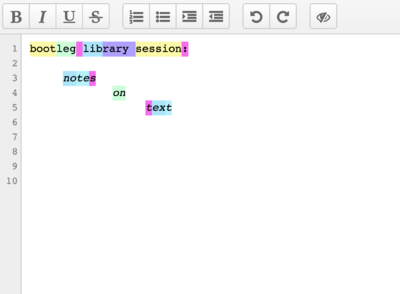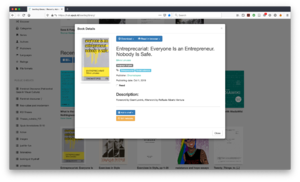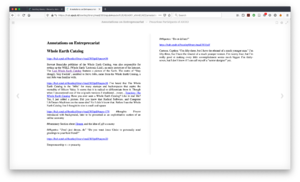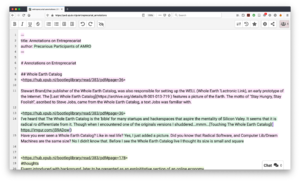User:Simon/bootleg library at AMRO20: Difference between revisions
(Created page with "== bootleg library at Art Meets Radical Openness 21.05.20 == border|400px === description === '''Bootleg Library Session: Notes on Texts''' The ''b...") |
(→photos) |
||
| (5 intermediate revisions by the same user not shown) | |||
| Line 41: | Line 41: | ||
=== photos === | === photos === | ||
[[File:Annotations on Entreprecariat 01.png|thumb|The book we chose to annotate]] | |||
[[File:Annotations on Entreprecariat 02.png|thumb|The EPUB we produced in the bootleglibrary]] | |||
[[File:Annotations on Entreprecariat 03.png|thumb|Our annotations on a pad]] | |||
=== pad === | |||
https://pad.xpub.nl/p/Art_Meets_Radical_Openness_2020 | |||
[[User:Simon/Notes on texts workflow]] | |||
<gallery> | <gallery> | ||
</gallery> | </gallery> | ||
Latest revision as of 15:16, 1 November 2021
bootleg library at Art Meets Radical Openness 21.05.20
description
Bootleg Library Session: Notes on Texts The bootleg library is a particular, situated social infrastructure that operates from the understanding that the library is a collection of texts and readers. A reciprocal, self-reflexive relationship between the texts the readers produce, and the readers produced by the collection drives the sociability of the library. The bootleg library celebrates idiosyncrasy, and resists the singularity of the text.
A bootleg is an unauthorised copy of a source publication; bootlegging is a strategy by which texts acquire multiplicity of form and informal distribution methods, representing readers and connecting them with each other.
Abstract of session Notes on Texts is a session that annotates a library. It understands reading and writing to be fundamental library practices, and asks how new reader/writers may participate in producing texts that both describe the collection and represent themselves. This session will be centred around the *bootleg library*, a shared digital and physical collection of republished texts. Bootlegs; unauthorised copies of source publications that represent ourselves, our multiplicity and our shared interests. A library; a collection of texts and also the readers collected around them.
Previous bootleg library sessions have been moments to meet in various spaces with the people who frequent them, discuss things we read, add to the collection, and offer each other contingencies through the texts we share.
For this session we'll meet online in a web conference, in the digital bootleg library, and in a realtime collaborative text-editing environment. We'll explore how being together in- and out of sync and the mediums and techniques we use will shape the texts we share.
You are invited to experiment with annotation to produce texts by new readers (and writers), imagining ways that we can guide each other towards the things we read. What type of contingencies can we offer each other at our meeting and throughout AMRO2020, using the particular, situated social infrastructure the *bootleg library* maintains? How can we enrich texts through our annotations, and what kind of new texts can we produce through our notes?
Requirements The bootleg library has grown through individual contributions of a vast variety of texts. The collection includes many texts on critical feminist and media theory, literature, sound art, as well as technical manuals, but the collection is not exclusive to these interests. There is no set criteria for texts that can be included. Please come to this session with any ebooks that you are familiar with, are representative of your interests, and which you would like to share.
This session will focus specifically on annotation. Please prepare annotation(s) on the text(s) you'd like to include in the library.
File formats The bootleg library runs on calibre-web https://github.com/janeczku/calibre-web , and supports a wide range of file formats, including .pdf, .epub, .mobi, .docx, .odt, .rtf, .txt, .mp3, .mp4a, .cbr, .cbz, .cbt, and many more.
Outcomes
We planned to meet in an online web conference, in an Etherpad and in the digital bootleg library. This was tricky, given that many of us were meeting for the first time, and we didn't have the same visual cues to work with. After a brief tutorial, we went through the library and added annotations in a pad. This has been transposed here
The basic workflow was:
pdf > pad > markdown > pandoc > EPUB > library
We chose a page from a PDF in the library to annotate, then wrote on pad, collaboratively. Markdown was added to create basic structure (this was especially important for the hyperlinks), and then we exported a .txt file from the pad. This was then run through pandoc with the following command:
pandoc --from markdown --to epub my_etherpad.txt -o annotations.epub
The EPUB that was produced was then catalogued under the same listing as the PDF.
photos
pad
https://pad.xpub.nl/p/Art_Meets_Radical_Openness_2020
User:Simon/Notes on texts workflow




